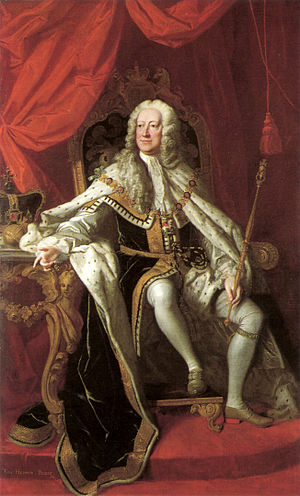George II (George Augustus; German: Georg II. August; 30 October / 9 November 1683 – 25 October 1760) was King of Great Britain and Ireland, Duke of Brunswick-Lüneburg (Hanover) and Prince-elector of the Holy Roman Empire from 11 June 1727 (O.S.) until his death.George was the last British monarch born outside Great Britain: he was born and brought up in northern Germany. In 1701, his grandmother, Sophia of Hanover, became second in line to the British throne after about 50 Catholics higher in line were excluded by the Act of Settlement, which restricted the succession to Protestants. After the deaths of Sophia and Anne, Queen of Great Britain, in 1714, his father George I, Elector of Hanover, inherited the British throne. In the first years of his father's reign as king, George was associated with opposition politicians, until they re-joined the governing party in 1720.As king from 1727, George exercised little control over British domestic policy, which was largely controlled by the Parliament of Great Britain. As elector, he spent 12 summers in Hanover, where he had more direct control over government policy. He had a difficult relationship with his eldest son, Frederick, who supported the parliamentary opposition. During the War of the Austrian Succession, George participated at the Battle of Dettingen in 1743, and thus became the last British monarch to lead an army in battle. In 1745, supporters of the Catholic claimant to the British throne, James Francis Edward Stuart ("The Old Pretender"), led by James's son Charles Edward Stuart ("The Young Pretender" or "Bonnie Prince Charlie"), attempted and failed to depose George in the last of the Jacobite rebellions. After Prince Frederick died unexpectedly in 1751, George's grandson, George III, became heir apparent and ultimately king.For two centuries after the death of George II, history tended to view him with disdain, concentrating on his mistresses, short temper, and boorishness. Since then, some scholars have re-assessed his legacy and conclude that he held and exercised influence in foreign policy and military appointments.

Fin de la actividad (año)
1760
Alias
Georg II August
Fecha de nacimiento
1683-11-09
Año de nacimiento
1683
Fecha de defunción
1760-10-25
Año de defunción
1760



Comentar
0